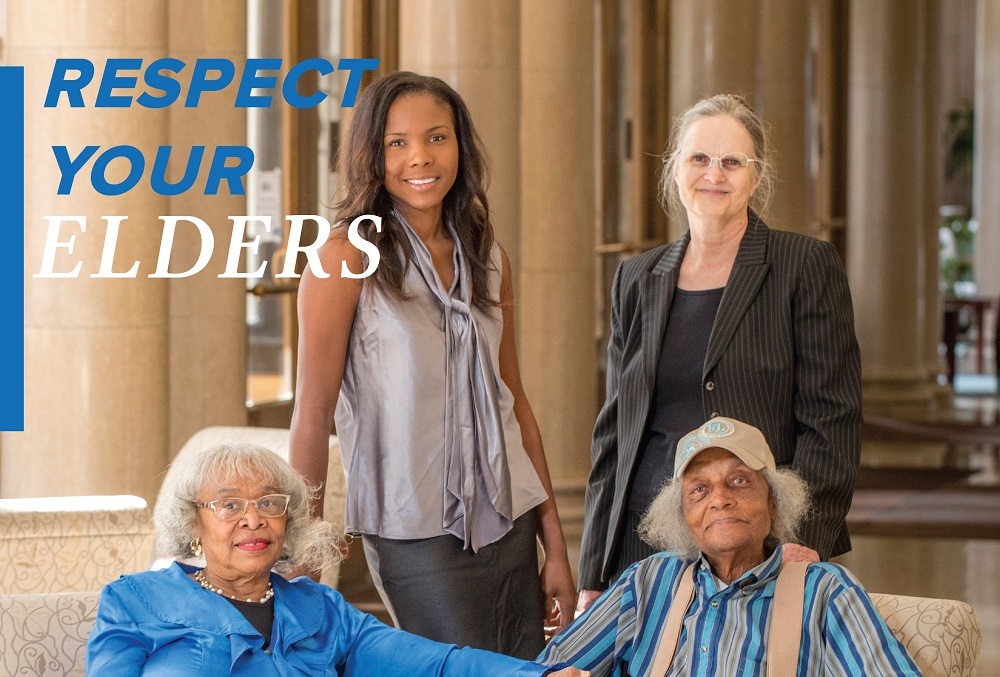
It's all too common to hear a tragic story about a senior citizen being scammed out of their life savings. Unfortunately, we've also all seen the news reports of nursing home abuse or neglect. And seniors having to deal with the care of a loved one or the legal aftereffects of their death are all too common situations. No one wants to think about their elderly loved ones being taken advantage of or not having the resources they need to take care of themselves. That's why legal clinics such as our Elder Law Clinic are so important. Everyone gets older. It's unavoidable. But the need and ability to help this segment of our communities should never be something we avoid. Our students, as well as our faculty and staff in our Elder Law Clinic, prove that every single day, assisting clients that otherwise might have nowhere to go for help.
Fannie Byrd is 78 years old. She lives in an area of Memphis that is typically regarded as poverty-stricken, with a rate of violent crime that is one of the highest in the city. She's also the type of person who doesn't care about any of that and who raised successfully raised a family amidst all of these adverse conditions. But she reached a point recently where she needed help.
"This was the first time I had to go through anything like this," Ms. Byrd said. "I was just so glad to find somebody that could help me and guide me through everything."
In 2004, her adult son was in a tragic car accident, becoming a quadriplegic as a result of the wreck. At the time of his accident, her son was married and had a good job as a truck driver. However, after his injuries left him permanently and totally paralyzed, unable to speak or even breathe without assistance, he needed around-the-clock care. His wife had a job at a casino in Tunica, and with him now unemployed, she could not afford to quit, but at the same time, she couldn't stay home to take care of him. So, they moved in with Ms. Byrd as soon as he was discharged. She took care of him while his wife continued to work at the casino.
But unfortunately, life didn't get any easier for the Byrd family. The arrangement worked well for a number of years until the wife was diagnosed with cancer, and eventually died in 2018. His wife was recognized by their healthcare providers as having authority to make medical decisions for her husband, with her name also being on the bank account where his social security check was deposited, so Ms. Byrd now needed to go to court in order to obtain the conservatorship she needed to continue to be able to take care of her son. Something she had no idea how to do or the money needed to do so.
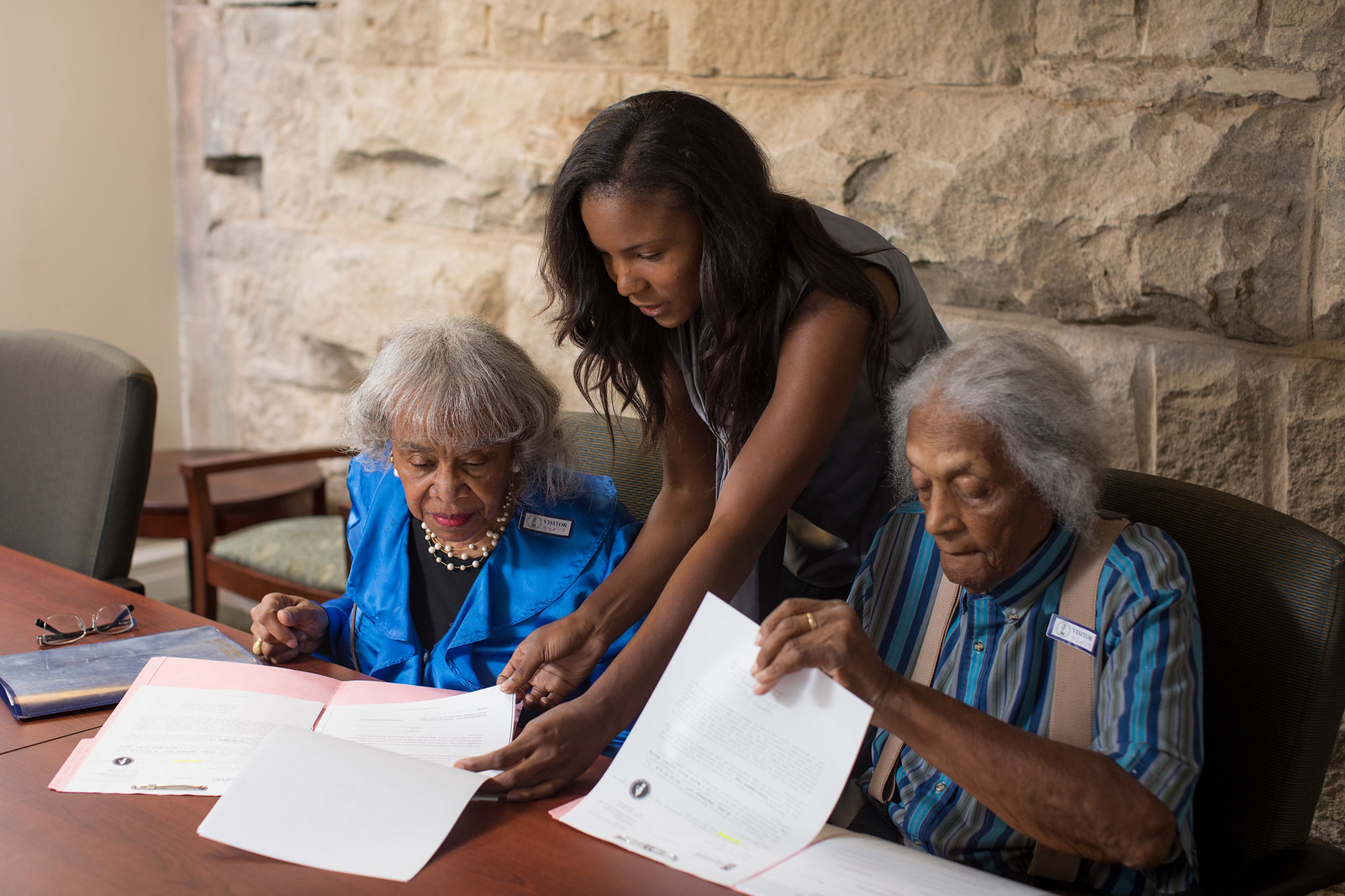
The Elder Law Clinic took her case on a referral from Memphis Area Legal Services and helped her through every step of the process, ultimately securing the conservatorship for her son, with her now being able to successfully take care of him to this day. She couldn't be more thankful or happy about the entire experience. Neither of them plans on going anywhere, anytime soon, thanks to the clinic.
"I just couldn't ask for anything better," Ms. Byrd said. "I never had a bad student with me. Every single one that helped me on my case with my son was so helpful, professional, and on top of things."
The field of Elder Law is not going anywhere either. The area is ranked among the "Top 10 Hottest Areas of Law Practice," according to the National Jurist, and with over 10,000 Americans reaching retirement age every day, this clinic provides students with the invaluable opportunity to learn the unique set of skills required to practice in the field.
"I clerked for a law firm all three years of law school, but I firmly believe there
is no better way to learn how to practice law than through this clinic," said Alexandra
Chunn (JD '19).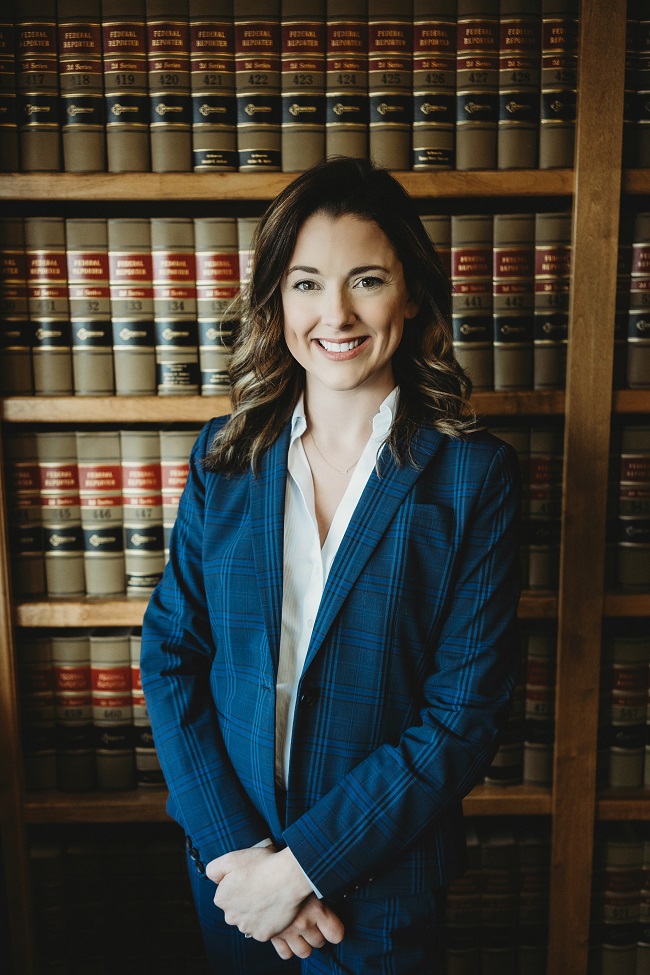
"I learned how to work a case from inception to the finish line. I learned almost every aspect of a case from client interview and intake to actually presenting a case in front of a judge and closing out the file. When you leave the Elder Law Clinic, you are transformed, emerging as a competent student attorney, ready to handle any aspect of a case."
As it celebrates its 25th year this academic year, the Memphis Law Elder Clinic has really only ever seen two professors serve as its leader. Carl Seely was the Clinic's founding instructor when the program was still situated in the offices of Memphis Area Legal Services in the old Claridge House building downtown.
"I believe we had six students that first semester," Seely says of the early days. "We shared a secretary with Connie Ross (the General Sessions Clinic professor), with much of the time really being spent in the MALS library. Many of the cases back then involved drafting documents for clients, such as wills, powers of attorney, etc. But much of the work in those days focused on client interviewing and legal drafting."
After a couple of years leading the Elder Law Clinic, Seely decided he preferred a return to his home of Jackson, Tenn. in order to set up his own elder law practice, and in stepped the faculty member most students recall as the face of the Elder Law Clinic today – Donna Harkness.
"When I was first hired in the fall of 1993, the Legal Clinic was under the direction of Professor Larry Pivnick, and consisted of a General Sessions Civil Clinic, that was supervised by Connie Ross," said Professor Harkness. "I was brought on as a second supervising attorney for the General Sessions Clinic, with the goal of expanding the Clinic's capacity to handle appeals from General Sessions Court to Circuit Court."
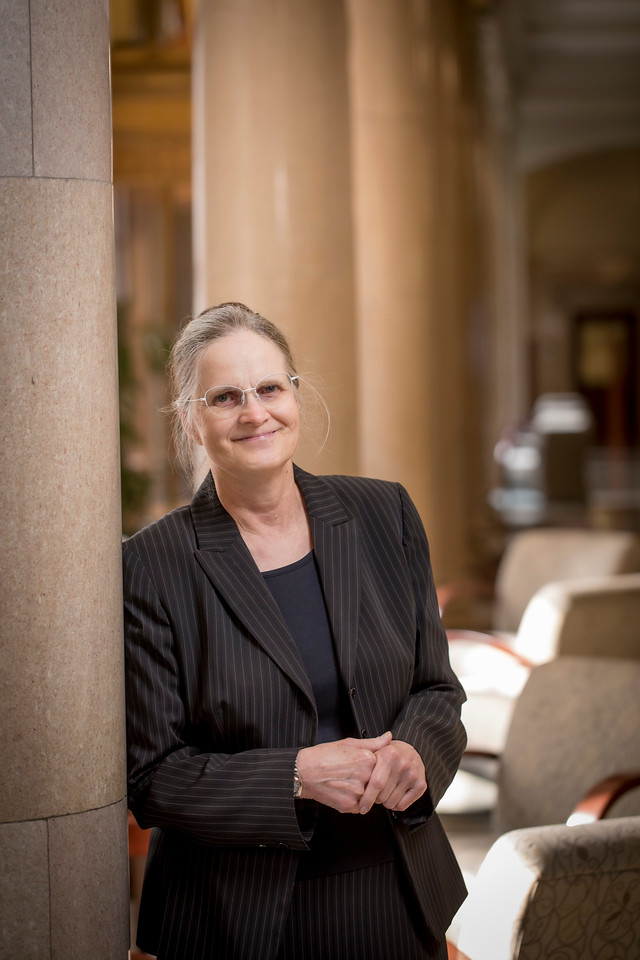 At the time, all of the Clinic's positions were grant-funded and the grant money for
her position was set to run out at the end of the 1996 academic year, meaning that
Professor Harkness was about to have to look for another job. However, Professor Seely's
timely relocation opened up the opportunity for her to transition into the Elder Law
Clinic supervising attorney role, which she gladly accepted.
At the time, all of the Clinic's positions were grant-funded and the grant money for
her position was set to run out at the end of the 1996 academic year, meaning that
Professor Harkness was about to have to look for another job. However, Professor Seely's
timely relocation opened up the opportunity for her to transition into the Elder Law
Clinic supervising attorney role, which she gladly accepted.
"Professor Pivnick asked if I would consider stepping into the Elder Law Clinic position, and I was delighted to do so, and have continued to be delighted ever since," Harkness happily noted.
As our students can attest, elderly clients can present a number of unique circumstances, vulnerabilities, and overall issues in need of attention. These could range from issues regarding communication, diminished mental capacity, transportation issues, abuse, and more. All of these unique items demand a special combination of patience, creativity, sensitivity, and foresight. It's not your standard combination of skills, nor is it your standard client with the regular "textbook" situations.
And with over 65 different senior citizens receiving assistance in over 125 cases handled by students in the Elder Law Clinic last year alone, the number of different cases, circumstances, and challenges are numerous.
Many of the clients here are older and not comfortable in these settings. Additionally,
they may have trouble communicating or presenting their full background of issues
adequately. That is why it is essential for students in this clinic to learn how to
create an inviting and accommodating atmosphere, a skill necessary for any attorney
providing direct client services, no matter their age.
"I have learned that establishing trust with your client on the front end makes for
a much easier attorney-client relationship on the back end," notes recent graduate
Chunn. "Learning how to translate the law to make it palatable to your clients is
such a crucial skill that many attorneys never learn but is a skill that never goes
unnoticed and unappreciated by your clients."
That practice of honing your communication skills is one that other former students
noted as extremely important as well.
"Early on during my semester in the clinic, Professor Harkness taught us about the
importance of clear communication with the client," said Zachary Coleman (JD '19).
"We role played with hypothetical clients and learned how to ask the right questions
so that we could completely understand the client's position and what their goals
were."
"I believe that clear, concise communication with the client is key to ensuring that your client's goals are met. Whether your client is an individual or an organization, you have to communicate clearly with the client. Once you have a clear line of communication and understand your client's goals, you can then advocate zealously for your client, whether that occurs by preparing a will or power of attorney, helping them apply for various items or advocating on their behalf in a courtroom."
This clinic also provides many students with their first real experiences practicing law, while also giving them some unique generational perspective.
"Because our clients are 55 and over, and the average age of our students is 25, the
Elder Law Clinic provides a wonderful opportunity for inter-generational interaction
that is beneficial for both seniors and students," said Professor Harkness.
Harkness also notes that one of the unique things about this practice area and clinic
is that while it is indeed one of the hottest areas to practice nationwide, the Elder
Law Clinic provides the most traditional settings of any of the clinics provided by
the law school, in that it operates much the same way a small law firm practice would,
with each student representing individual clients in individual case matters. That
structure is important to these students as they enter into their first client meetings
and experiences dealing with real-world legal matters. The holistic approach that
the clinic utilizes requires the student-attorneys to consider and to counsel their
clients about a number of issues relating to the client's present and future civil
legal needs, and Harkness emphasizes the importance of the role of the elder law attorney
as someone who advocates for clients who may be vulnerable, but are still deserving
of dignity, autonomy, and quality of life.
"I hope that the clients feel that they have been well and competently served, and that they realize the great contribution that they have made to the education of this new generation of lawyers by giving their consent to be represented by someone who is still learning," said Professor Harkness.
"It's been 15 years this year since he was hurt in his accident and we didn't know how things were going to go at the time," said Ms. Byrd. 'But thanks to the clinic, things are good today and my son is doing fine. We just wouldn't be where we are today without them. I'm very thankful."
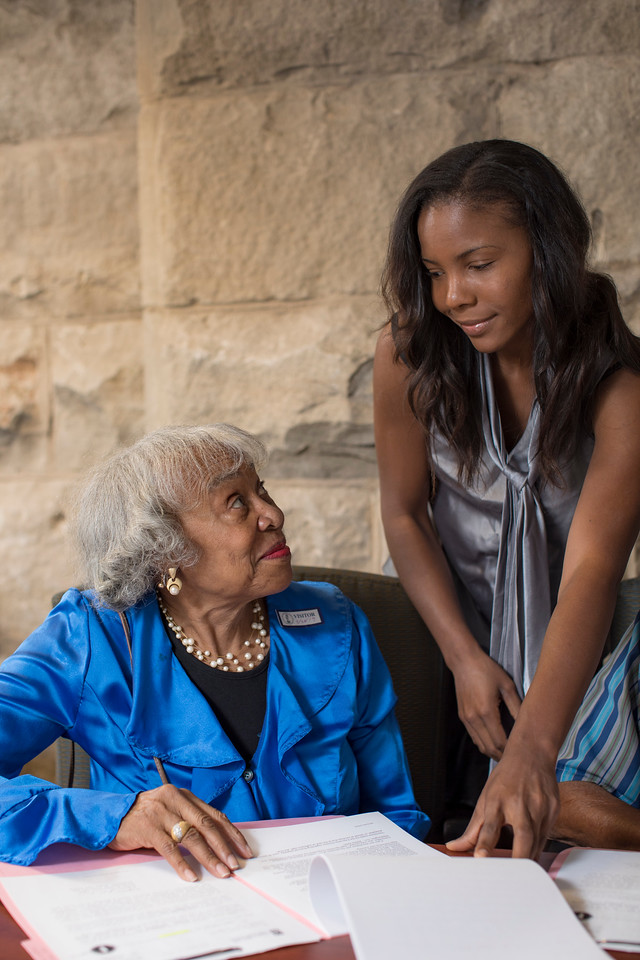
That feeling goes both ways.
"I was shocked to experience, albeit second-hand, the obstacles, predatory practices, and outright swindling that many elders deal with," said Ms. Chunn. "I became passionate about advocating for and representing them. I was not only willing, but enthused to spend any spare second I had in the Clinic to assist my clients. I was encouraged by their grit, graciousness, and willingness to trust a law student to help them. It was truly the single most rewarding experience of my law school tenure."
As the area of law becomes more and more popular, while the Clinic continues to help those citizens in need of services more than most people realize, Harkness hopes that students continue to see the importance of the work they are doing.
"I hope that the students enjoy the interaction with "live clients" and recognize that as a result of these first attorney/client relationships what a privilege it is to represent someone," she said. "And I hope they see really see what great satisfaction there is in providing high quality representation that has the potential to change another person's life."

